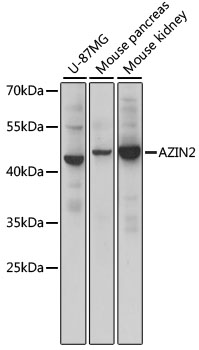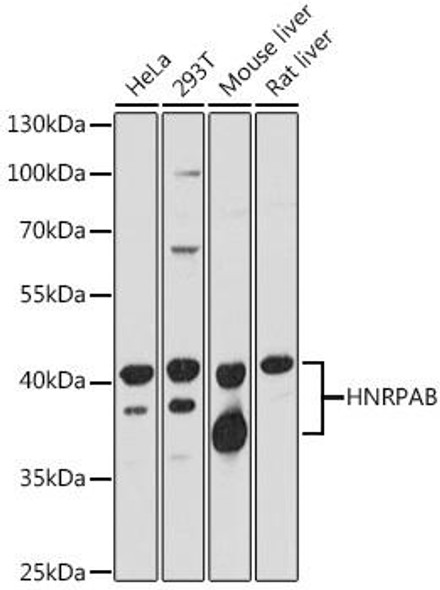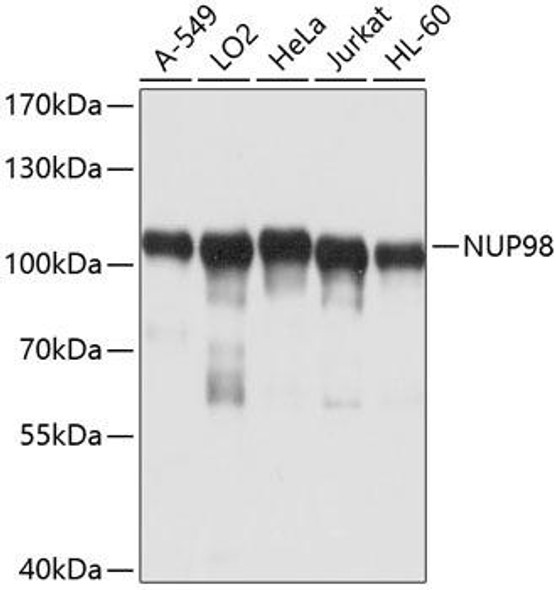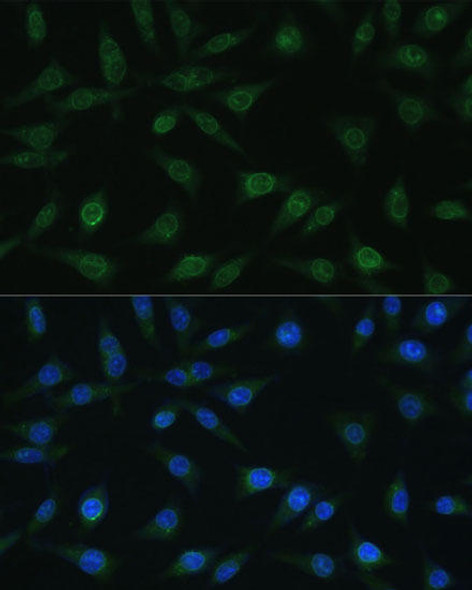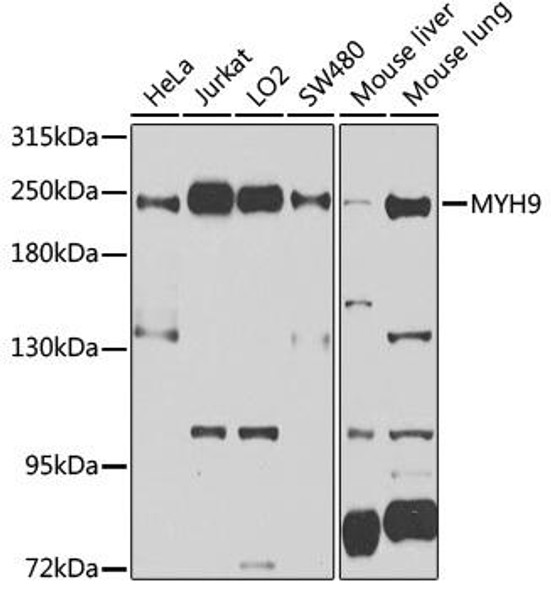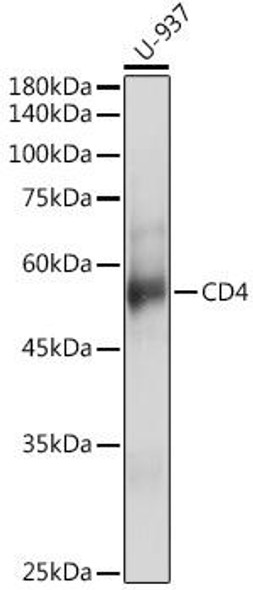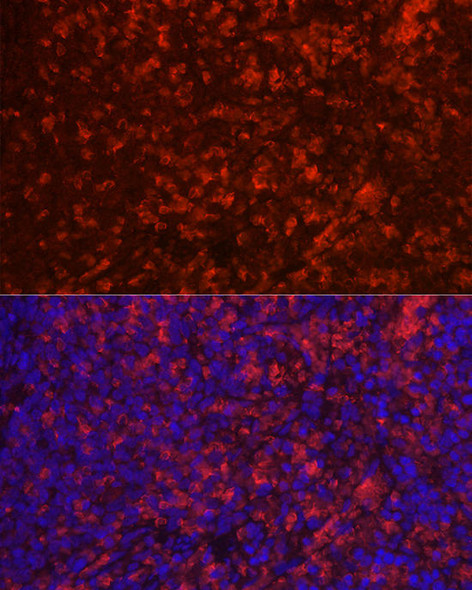Description
AZIN2 Rabbit Polyclonal Antibody (CAB15936)
The Azin2 Polyclonal Antibody (CAB15936) is a valuable tool for researchers studying Azin2, a protein involved in regulating cell growth and metabolism. This antibody, produced in rabbits, is highly specific for human samples and is validated for use in various experimental techniques, including Western blotting. By binding to Azin2, this antibody allows for the detection and analysis of Azin2 levels in different cell types, making it ideal for studies in cell biology, cancer research, and metabolism.Azin2 is a key player in the control of cell proliferation and metabolism, making it a promising target for understanding and potentially treating diseases like cancer and metabolic disorders.
Research into Azin2 can provide insight into the mechanisms underlying cell growth and metabolism regulation, offering potential avenues for developing therapeutic interventions in these areas. The Azin2 Polyclonal Antibody is a valuable tool for researchers looking to delve deeper into the role of Azin2 in health and disease.
| Product Name: | AZIN2 Rabbit Polyclonal Antibody |
| SKU: | CAB15936 |
| Size: | 20uL, 100uL |
| Isotype: | IgG |
| Host Species: | Rabbit |
| Reactivity: | Human,Mouse |
| Immunogen: | Recombinant fusion protein containing a sequence corresponding to amino acids 1-360 of human AZIN2 (NP_443724.1). |
| Sequence: | MAGY LSES DFVM VEEG FSTR DLLK ELTL GASQ ATTD EVAA FFVA DLGA IVRK HFCF LKCL PRVR PFYA VKCN SSPG VLKV LAQL GLGF SCAN KAEM ELVQ HIGI PASK IICA NPCK QIAQ IKYA AKHG IQLL SFDN EMEL AKVV KSHP SAKM VLCI ATDD SHSL SCLS LKFG VSLK SCRH LLEN AKKH HVEV VGVS FHIG SGCP DPQA YAQS IADA RLVF EMGT ELGH KMHV LDLG GGFP GTEG AKVR FEEI ASVI NSAL DLYF PEGC GVDI FAEL GRYY VTSA FTVA VSII AKKE VLLD QPGR EEEN GSTS KTIV YHLD EGVY GIFN SVLF DNIC PTPI LQKK PSTE QPLY SSSL WGPA |
| Tested Applications: | WB ELISA |
| Recommended Dilution: | WB,1:500 - 1:2000 |
| Synonyms: | ADC; AZI2; ODCp; AZIB1; ODC-p; ODC1L; AZIN2 |
| Positive Sample: | U-87MG,Mouse pancreas,Mouse kidney |
| Conjugate: | Unconjugated |
| Cellular Localization: | Cell projection, Cytoplasm, Cytoplasmic granule, Cytoplasmic vesicle, Endoplasmic reticulum-Golgi intermediate compartment, Golgi apparatus, Membrane, Nucleus, Perikaryon, axon, cis-Golgi network, dendrite, perinuclear region, trans-Golgi network. |
| Calculated MW: | 50kDa |
| Observed MW: | 50kDa |
The protein encoded by this gene belongs to the antizyme inhibitor family, which plays a role in cell growth and proliferation by maintaining polyamine homeostasis within the cell. Antizyme inhibitors are homologs of ornithine decarboxylase (ODC, the key enzyme in polyamine biosynthesis) that have lost the ability to decarboxylase ornithine; however, retain the ability to bind to antizymes. Antizymes negatively regulate intracellular polyamine levels by binding to ODC and targeting it for degradation, as well as by inhibiting polyamine uptake. Antizyme inhibitors function as positive regulators of polyamine levels by sequestering antizymes and neutralizing their effect. This gene encodes antizyme inhibitor 2, the second member of this gene family. Like antizyme inhibitor 1, antizyme inhibitor 2 interacts with all 3 antizymes and stimulates ODC activity and polyamine uptake. However, unlike antizyme inhibitor 1, which is ubiquitously expressed and localized in the nucleus and cytoplasm, antizyme inhibitor 2 is predominantly expressed in the brain and testis and localized in the endoplasmic reticulum-golgi intermediate compartment. Recent studies indicate that antizyme inhibitor 2 is also expressed in specific cell types in ovaries, adrenal glands and pancreas, and in mast cells. The exact function of this gene is not known, however, available data suggest its role in cell growth, spermiogenesis, vesicular trafficking and secretion. Accumulation of antizyme inhibitor 2 has also been observed in brains of patients with Alzheimer's disease. There has been confusion in literature and databases over the nomenclature of this gene, stemming from an earlier report that a human cDNA clone (identical to ODCp/AZIN2) had arginine decarboxylase (ADC) activity (PMID:14738999). Subsequent studies in human and mouse showed that antizyme inhibitor 2 was devoid of arginine decarboxylase activity (PMID:19956990). Alternatively spliced transcript variants have been described for this gene.
| Purification Method: | Affinity purification |
| Gene ID: | 113451 |
| Storage Buffer: | Store at -20℃. Avoid freeze / thaw cycles.Buffer: PBS with 0.01% thimerosal,50% glycerol,pH7.3. |


